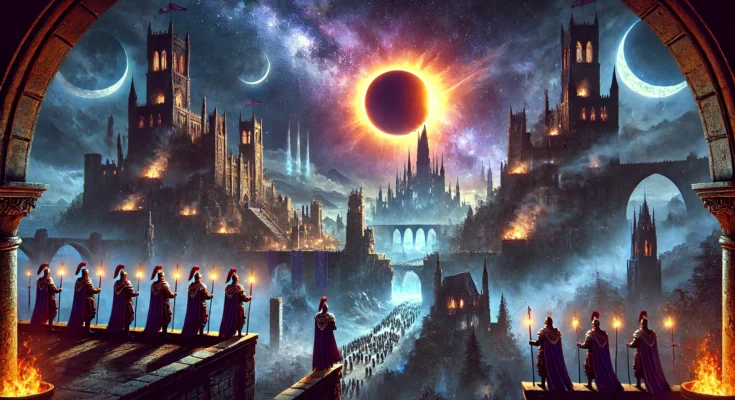In the world of gaming, few concepts capture the imagination as powerfully as the rise and fall of empires. Eclipse of Empires is a game that promises to immerse players in a rich, dynamic world where strategy, diplomacy, and survival are paramount. Set in a sprawling, war-torn universe, the game combines elements of grand strategy, role-playing, and resource management to create an experience that is as challenging as it is rewarding. This article delves into the core elements of Eclipse of Empires, exploring its setting, gameplay mechanics, and the themes that make it a standout title in the strategy genre.
The Setting: A World on the Brink
Eclipse of Empires is set in a fictional universe where ancient civilizations clash amidst the backdrop of a dying star. The game’s world, Aeloria, is a sprawling continent divided into warring kingdoms, each vying for dominance as the celestial eclipse approaches. The eclipse is not just a visual spectacle; it is a harbinger of doom, signaling the end of an era and the collapse of the old world order.
The lore of Eclipse of Empires is deeply rooted in the tension between tradition and progress. The Eldorian Empire, once the dominant power, now teeters on the brink of collapse, its once-great cities crumbling under the weight of corruption and rebellion. Meanwhile, the Valkyrian Confederacy, a coalition of nomadic tribes, seeks to carve out a new future by harnessing forbidden technologies. Other factions, such as the Shadow Cabal and the Ironclad Dominion, add layers of intrigue and conflict, each with their own motivations and secrets.
The game’s world-building is a highlight, with every faction, city, and character having a unique backstory that ties into the larger narrative. Players are not just passive observers; they are active participants in shaping the fate of Aeloria.
Gameplay Mechanics: Strategy Meets Storytelling
At its core, Eclipse of Empires is a grand strategy game, but it distinguishes itself with a heavy emphasis on narrative and player choice. The gameplay is divided into several key components:
1. Empire Building and Resource Management
Players begin by choosing a faction and establishing their empire. This involves managing resources such as gold, food, and rare materials like Eclipsium, a mysterious substance tied to the eclipse. Cities must be developed, armies trained, and alliances forged. However, resources are finite, and every decision carries consequences. Will you prioritize military strength, or focus on diplomacy and trade?
2. Dynamic Faction System
The factions in Eclipse of Empires are not static entities. They evolve based on player actions and world events. For example, if the Eldorian Empire is pushed to the brink of collapse, it may fracture into smaller states, each with its own agenda. Similarly, the Valkyrian Confederacy might unite under a charismatic leader if the player aids their cause. This dynamic system ensures that no two playthroughs are the same.
3. Tactical Combat
When diplomacy fails, players must take to the battlefield. Combat in Eclipse of Empires is a blend of real-time strategy and turn-based tactics. Players can command armies on a macro level, directing troops across vast battlefields, or zoom in to control individual units in key skirmishes. The game also introduces unique mechanics, such as Eclipse Powers, which grant temporary abilities based on the phase of the eclipse.
4. Narrative-Driven Quests
While the overarching goal is to dominate Aeloria, the game is filled with narrative-driven quests that add depth to the experience. These quests are not mere side missions; they are integral to the story and often involve moral dilemmas. For instance, players might have to choose between saving a besieged city or pursuing a rival faction’s leader. These choices shape the world and determine the player’s legacy.
5. The Eclipse Countdown
The game’s most unique feature is the Eclipse Countdown, a ticking clock that adds urgency to every decision. As the eclipse approaches, the world undergoes dramatic changes. Crops fail, cities revolt, and ancient powers awaken. Players must prepare for the eclipse while dealing with the immediate threats posed by rival factions. The countdown creates a sense of tension and unpredictability, ensuring that the game remains engaging from start to finish.
Themes: Power, Betrayal, and Redemption
Eclipse of Empires is more than just a game about conquest; it is a meditation on power, betrayal, and redemption. The game explores how individuals and societies respond to existential threats. Will they cling to the past, or embrace change? Will they sacrifice their morals for survival, or strive to build a better future?
One of the central themes is the cycle of empires. The game challenges players to consider whether history is doomed to repeat itself, or if it is possible to break free from the patterns of the past. This theme is reflected in the game’s mechanics, such as the dynamic faction system and the Eclipse Countdown, which force players to adapt to a constantly changing world.
Another key theme is betrayal. In a world where alliances are fragile and trust is a luxury, players must navigate a web of intrigue and deception. Will you honor your agreements, or stab your allies in the back to secure victory? The game does not judge; it simply presents the consequences of your actions.
Finally, Eclipse of Empires explores the idea of redemption. Even in a world on the brink of collapse, there is hope. Players have the opportunity to redeem their factions, forging a new path for Aeloria. This theme is particularly evident in the game’s narrative quests, which often involve characters seeking to atone for past mistakes.
Visuals and Sound: A Feast for the Senses
Eclipse of Empires is a visual and auditory masterpiece. The game’s art style blends realism with fantasy, creating a world that feels both familiar and otherworldly. The cities are bustling hubs of activity, while the countryside is filled with lush forests, barren deserts, and crumbling ruins. The eclipse itself is a stunning visual centerpiece, casting an eerie glow over the landscape.
The sound design is equally impressive. The game’s soundtrack, composed by award-winning artists, features haunting melodies and epic orchestral pieces that enhance the emotional impact of key moments. The sound effects, from the clash of swords to the roar of the crowd, add to the immersion.
Conclusion: A New Benchmark for Strategy Games
Eclipse of Empires is a game that pushes the boundaries of the strategy genre. Its rich world-building, dynamic gameplay mechanics, and thought-provoking themes make it a must-play for fans of grand strategy and narrative-driven games. Whether you are a seasoned strategist or a newcomer to the genre, Eclipse of Empires offers an experience that is both challenging and rewarding.
As the eclipse looms over Aeloria, the question remains: what kind of leader will you be? Will you be a conqueror, a diplomat, or a savior? The choice is yours, and the fate of an empire hangs in the balance.
Let me know if you’d like me to expand on any specific aspect of the game or if you’d like help brainstorming more ideas!



